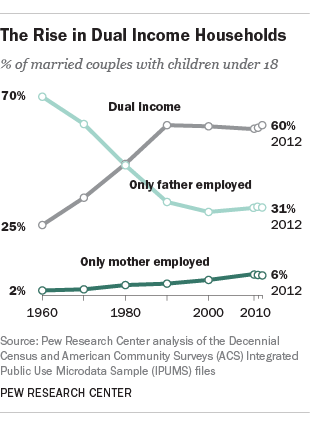Every year, most Americans experience a pay cut.
Just an hour outside of Boston, where I sometimes fly fish, I drive through very poor, rural, and white towns. I drive by trailer parks, through small towns with almost no economic activity, and into areas with high heroin addiction rates.
To better understand what is happening in those areas, I’d like to show you five charts.
1. After-inflation pay for males has been in decline for decades.

2. Pay for males is lower the less education they’ve attained, and, that also has been in decline over time.

3. Female wages have been the reason why households have been able to get by. More women have entered the workforce, and their wages have been rising.

4. Unfortunately, the percentage of dual-earner households has hit a saturation point.

5. All this means the following: after-inflation pay for households has been in decline.

So, many Americans are very open to a politician’s sales pitch that tells them that their economic decline is not their fault.
It’s why Sanders and Trump have defied conventional wisdom and continue to poll well. The former wants to redistribute income (“tax the rich”). The latter wants to do that, but also embrace protectionist policies (“immigrants take our jobs” and “cut better trade deals”).
Wages need to increase for the bulk of the population. Since 60% of Americans do not have a college degree, that means wages need to increase for those who are not living in cities, who are not part of the technology economy, and aren’t constantly on smartphone apps.
We either increase income for many Americans through a redistribution from the rich to the poor, or we strive to create an economy that does not increasingly concentrate wealth for those in the tech and finance sectors.
There really is no other option, or social unrest will grow.

All good facts and I think that most would agree. The challenge seems to be how to make redistribution by the government more effective in its impact, while allowing people to maintain their dignity in the process. Many people would prefer to support charitable programs directly than have our ineffective government pathetically manage it. Maybe we should introduce a percentage of income that has to be donated directly to certified charities – that would empower taxpayers, revitalize many great charitable organizations, and cut out the inefficient middleman?
That’s a very interesting idea! In Germany, houses of worship are supported by tax payers, for example, and you can choose which ones you want to support.
One of the tougher things for me to swallow as a millennial American is the zero-sum mindset, which is not helped by mainstream media and fear-mongering politicians. I would argue that there is a large swath of Americans who have the dangerous mindset of “more for you means less for me”. Any form of redistribution is only going to viewed through that lens, and only serve to widen the gap between the haves and the have-nots.
Good point, but I think the zero-sum mindset comes from a person’s frustration that eventually leads to anger and revolt. To me, social unrest eventually can increase and get to a breaking point. For example, some think a bread shortage led to the French Revolution and it’s zero sum thinking (which, ironically, only ended when France settled on another dictator, which was Napoleon).
So, all this to say that the root cause in my mind is not zero-sum thinking: it is not being able to provide for yourself or your family, which then leads to zero-sum thinking and the eventual social unrest.
I have 2 things to add. The first is that is the most effective way for government to change this is through continued investments in education and job trianing for those willing to invest in themselves.
The second is that the concentration at the top is no longer viewed as an outcome of luck, or smarts, or market insight. Increasingly, people view the game to be rigged through regulation (and lack thereof). One year after we bailed out banks and investment banks, those institutions were paying $10-50MM bonuses (and simultaneously lobbying like crazy).
Great post!
Thank you!
Jo –
Long time – hope all is well. I agree with your main point that we need to figure out how to increase wages for the lower/middle rung and yes that will be at the expense of the leaders and shareholders.
Agree with Alex that there is a zero sum mindset but worse than that is I think that is how the majority of people think economics works: GDP=100, 1% gets 80% of that and the rest fight for the leftover 20%.
Redistribution won’t increase wages or productivity and is a disincentive to work. What do you think about a private non profit agency that audits and certifies corporations based on their distribution of earnings and equity? Corps that provide good comp, good benefits get good ratings. If they share profits or equity they get great ratings. If the CEO and the Board and shareholders get it all – they get low scores. Would consumers and investors use a social benchmark like this to steer their purchasing? Or would we all buy WalMart and look the other way?
Moral capitalism is the only way and I think in our quest for profits we are killing the moral capitalist goose.
Thanks – enjoyed the post.
All great ideas, but with long-term and uncertain paybacks. Politicians won’t go for it.
Also, I find it ironic that some people who most need the government’s safety net (uneducated and poor) are instead voting for a guy who spews anti-government conspiracy theories.